Constant Contact is a well-known name in email marketing, but it isn’t the only player on the field. In fact, for many businesses — especially solopreneurs, small teams, and marketers on a budget — it might not even be the best choice. Whether you're looking for a more intuitive interface, better automation, affordable pricing, or all-in-one marketing features, there are plenty of Constant Contact alternatives worth considering.
In this comprehensive guide, we’ll explore the top alternatives to Constant Contact in 2025. Each one has unique strengths, and we’ll help you find the one that fits your business goals best.
Why Look for Constant Contact Alternatives?
While Constant Contact has solid name recognition, users often report frustrations, such as:
-
A dated user interface that's less intuitive than modern competitors
-
Limited automation and segmentation features for advanced campaigns
-
Expensive pricing, especially as your list grows
-
Fewer integrations and design templates compared to newer tools
1. PosterMyWall – Best All-in-One Tool for Email, Design, and Social Media
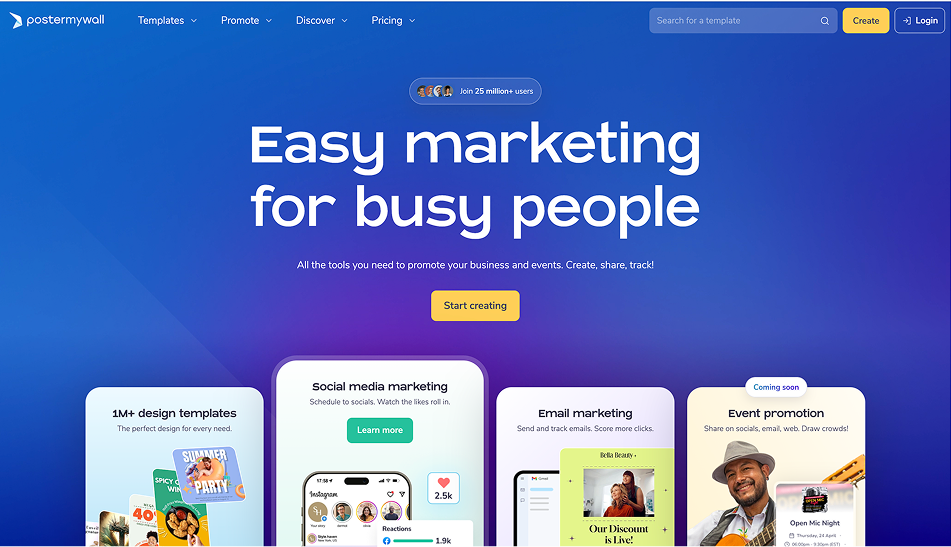
PosterMyWall stands out as an intuitive, all-in-one marketing solution designed for busy people — from small business owners and solopreneurs to churches and educators. It combines email marketing, graphic design, video content, and social media publishing in one powerful platform.
Key Features:
-
Drag-and-drop email editor with hundreds of templates
-
Automated email scheduling and contact management
-
AI-powered content tools (text suggestions, layout adjustments)
-
Integrated social media scheduler
-
Designs for flyers, menus, social posts, and videos
Pros:
PosterMyWall is incredibly easy to use. You can design your email, schedule it, and post promotional content on Facebook and Instagram — all without leaving the platform. It’s built for speed and simplicity, making it ideal for users without technical or design expertise.
The template library is also massive and tailored to real-world use cases like events, restaurants, fundraisers, and promotions.
Cons:
While it covers basic automation like scheduling, it doesn't offer advanced triggers or drip campaigns found in high-end ESPs.
Best For:
Small businesses, solopreneurs, educators, churches, and restaurants looking for an all-in-one marketing solution.
2. Mailchimp – Best for Integrated Email + CRM
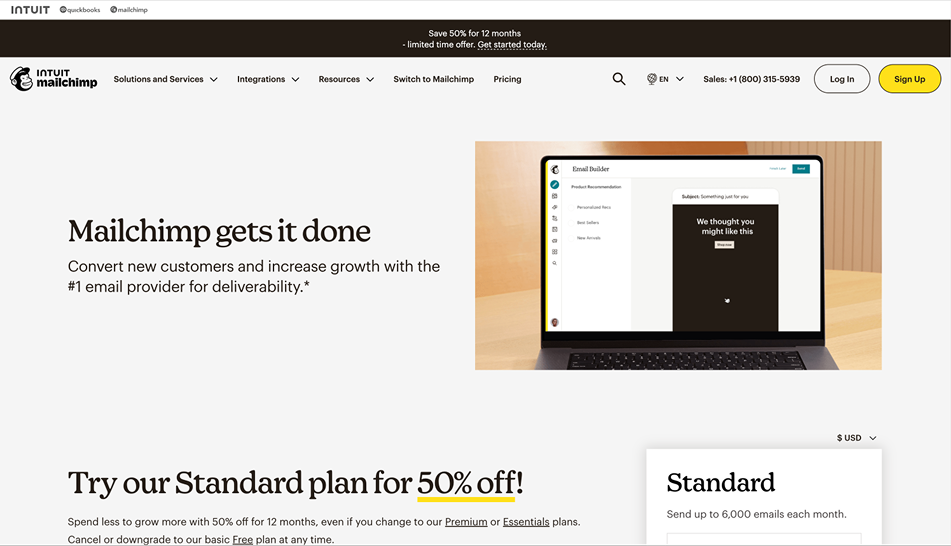
Mailchimp has evolved into a full-fledged marketing platform. It offers a modern editor, automation flows, analytics, and customer journey features — making it one of the most popular Constant Contact competitors.
Key Features:
-
Intuitive email editor with prebuilt journeys
-
CRM and contact segmentation
-
Multichannel campaigns: email, ads, landing pages
-
E-commerce integrations and product recommendations
Pros:
Mailchimp offers excellent templates and smart automation tools. You can build multi-step workflows and personalize emails based on user actions.
Its free tier is also generous, giving small businesses a chance to grow before needing to upgrade.
Cons:
It gets expensive fast. Once you need more automation, A/B testing, or analytics, the price jumps significantly.
Best For:
Ecommerce brands, startups, and marketers looking for all-in-one CRM + email functionality.
3. Moosend – Best for Advanced Email Automation and Segmentation
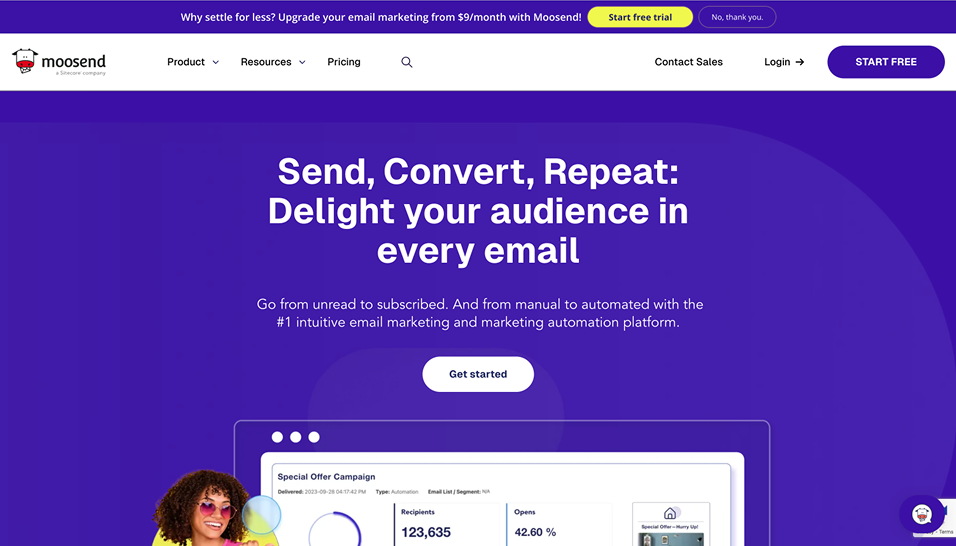
Moosend is an automation-driven email platform known for its visual campaign builder and personalization tools.
Key Features:
-
Powerful automation workflows
-
Dynamic personalization (product recommendations, weather, etc.)
-
Real-time reporting
-
Drag-and-drop email design
Pros:
Moosend’s automation builder rivals more expensive platforms. You can create campaigns triggered by specific behaviors, time delays, or segment interactions.
It’s a great choice for teams ready to scale their campaigns with data.
Cons:
The learning curve is slightly steeper than tools like PosterMyWall or Mailchimp, especially for beginners.
Best For:
Mid-sized businesses and digital marketers who want high-level automation without the cost of enterprise tools.
4. MailerLite – Best Budget-Friendly Tool with Clean Design
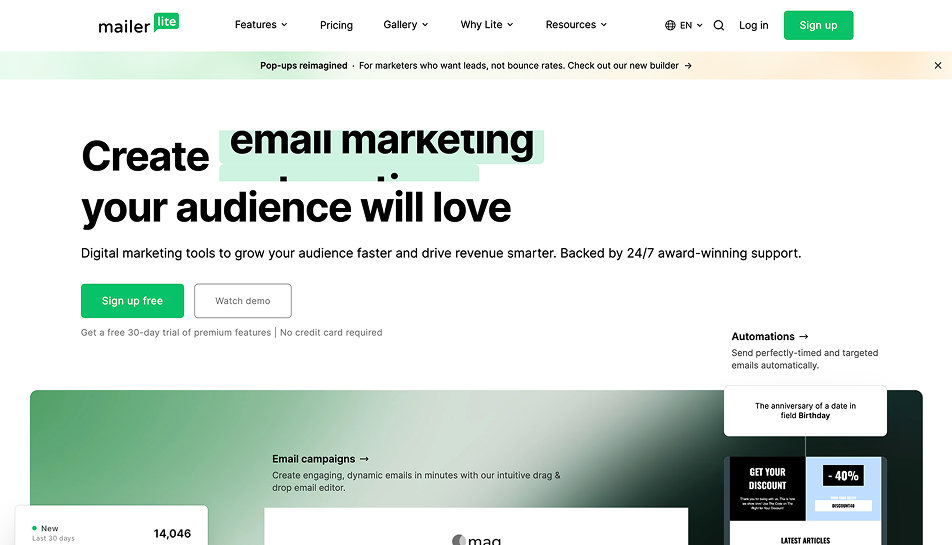
MailerLite is a minimalist email platform with robust features at a great price point. It’s often recommended for creators, bloggers, and small brands.
Key Features:
-
Email automation and landing pages
-
Simple drag-and-drop email builder
-
Subscriber tagging and segmentation
-
A/B testing and analytics
Pros:
The interface is clean, and the pricing is among the most affordable in the industry. You’ll find everything you need to grow a small list or brand — including popups, surveys, and forms.
Cons:
Template variety is somewhat limited compared to tools like PosterMyWall or Bee.
Best For:
Freelancers, bloggers, and small businesses looking for an affordable, easy-to-use email platform.
5. Brevo – Best for SMS + Email in One
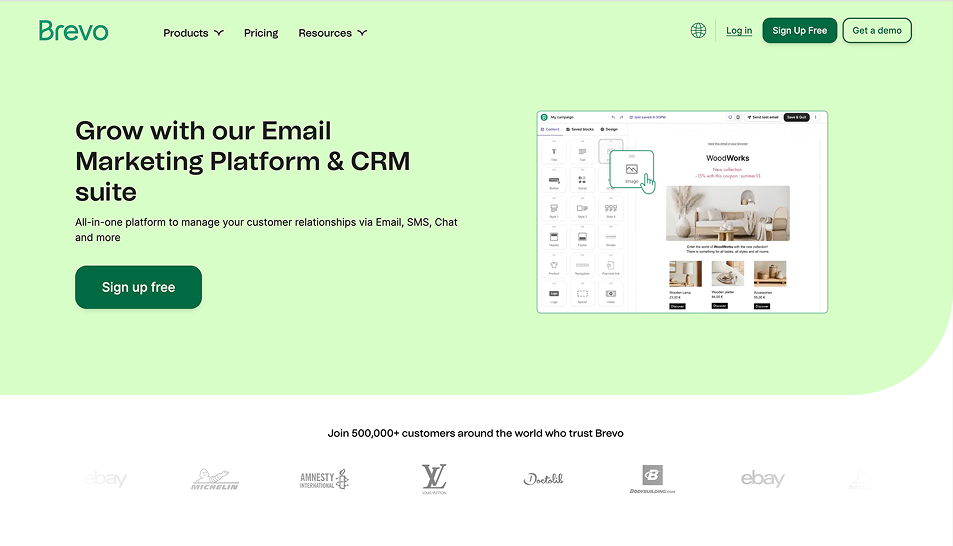
Sendinblue, recently rebranded as Brevo, offers email and SMS marketing in a unified platform.
Key Features:
Pros:
The multichannel focus makes Brevo perfect for businesses looking to communicate via both email and text. Its automation builder is easy to use and powerful.
The pay-as-you-go pricing model is great for businesses that send emails sporadically.
Cons:
The email editor is less fluid than Mailchimp or PosterMyWall. It’s more utility-driven than design-forward.
Best For:
Local businesses, service providers, and ecommerce brands using SMS and email together.
6. Kit – Best for Content Creators and Bloggers
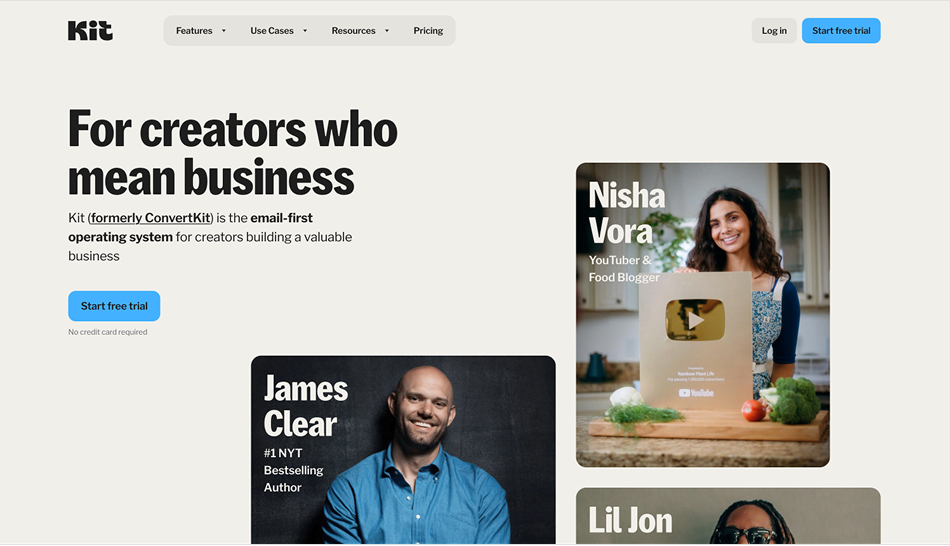
Kit is purpose-built for creators — think bloggers, YouTubers, and coaches — who want to nurture an audience and sell digital products.
Key Features:
-
Visual automation workflows
-
Landing page and opt-in form builder
-
Tag-based contact segmentation
-
Paid newsletters and digital product tools
Pros:
Kit’s simplicity is a big draw. You can build opt-ins, email sequences, and sell products directly from one dashboard. It’s ideal for creators who want to grow and monetize a list.
Cons:
Not the most design-flexible tool — templates are plain, and you’ll need external tools for graphics.
Best For:
Content creators, coaches, educators, and digital entrepreneurs.
7. Beefree – Best for Beautiful Email Design
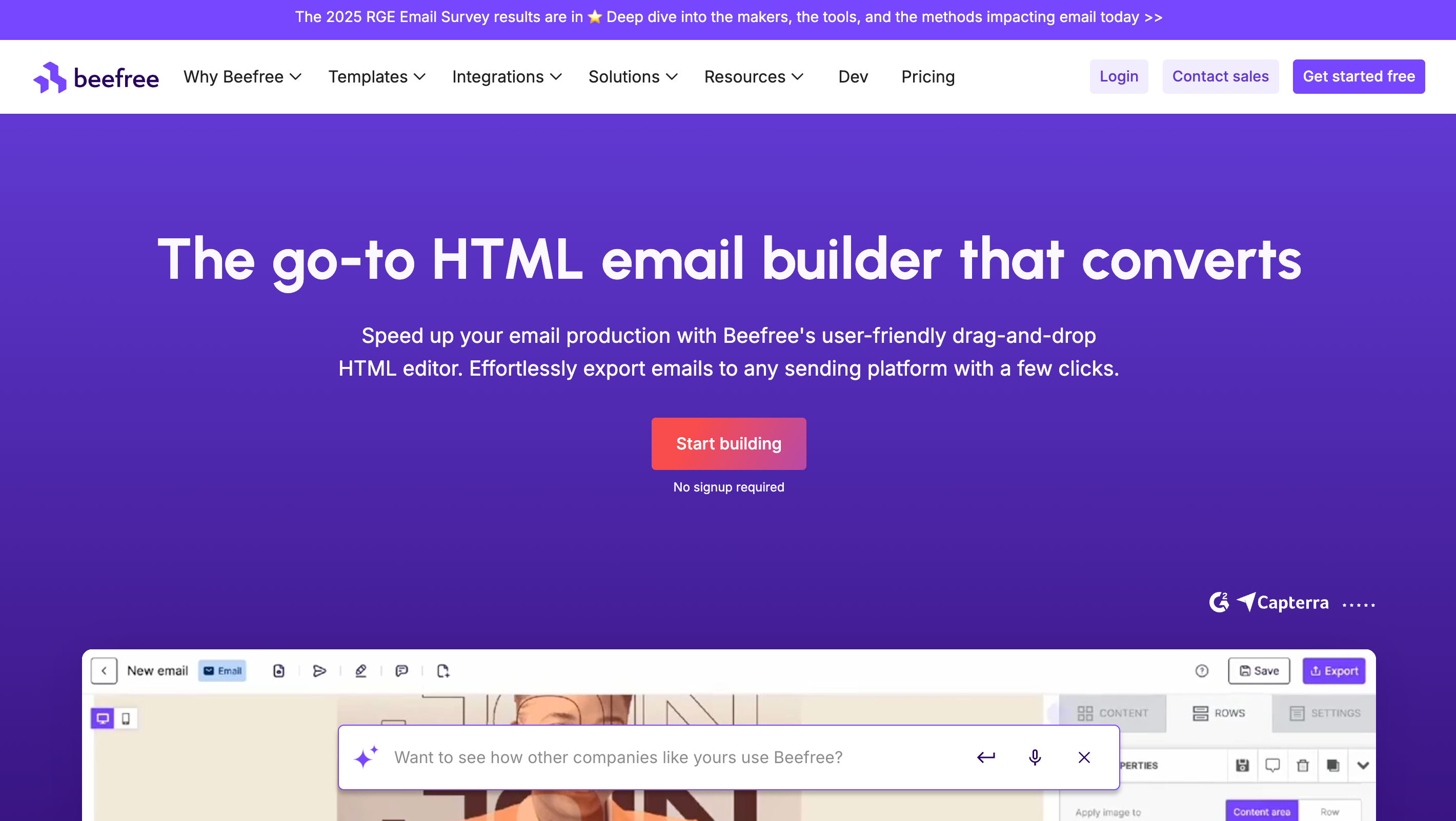
Beefree isn’t a full email marketing platform — it’s a powerful email design tool that lets you export your creations to your ESP of choice.
Key Features:
-
Drag-and-drop email and landing page builder
-
Collaborative editing and comments
-
Reusable design blocks and templates
-
Exports to major ESPs
Pros:
Beefree has some of the best email design tools available. You can quickly create pixel-perfect emails, and it’s especially great for agencies or teams with a high design standard.
Cons:
You’ll need to pair it with another tool to send emails, manage lists, or automate.
Best For:
Agencies, freelancers, and marketers who want to design beautiful emails without coding.
8. Benchmark Email – Best for Simple Automation and Surveys
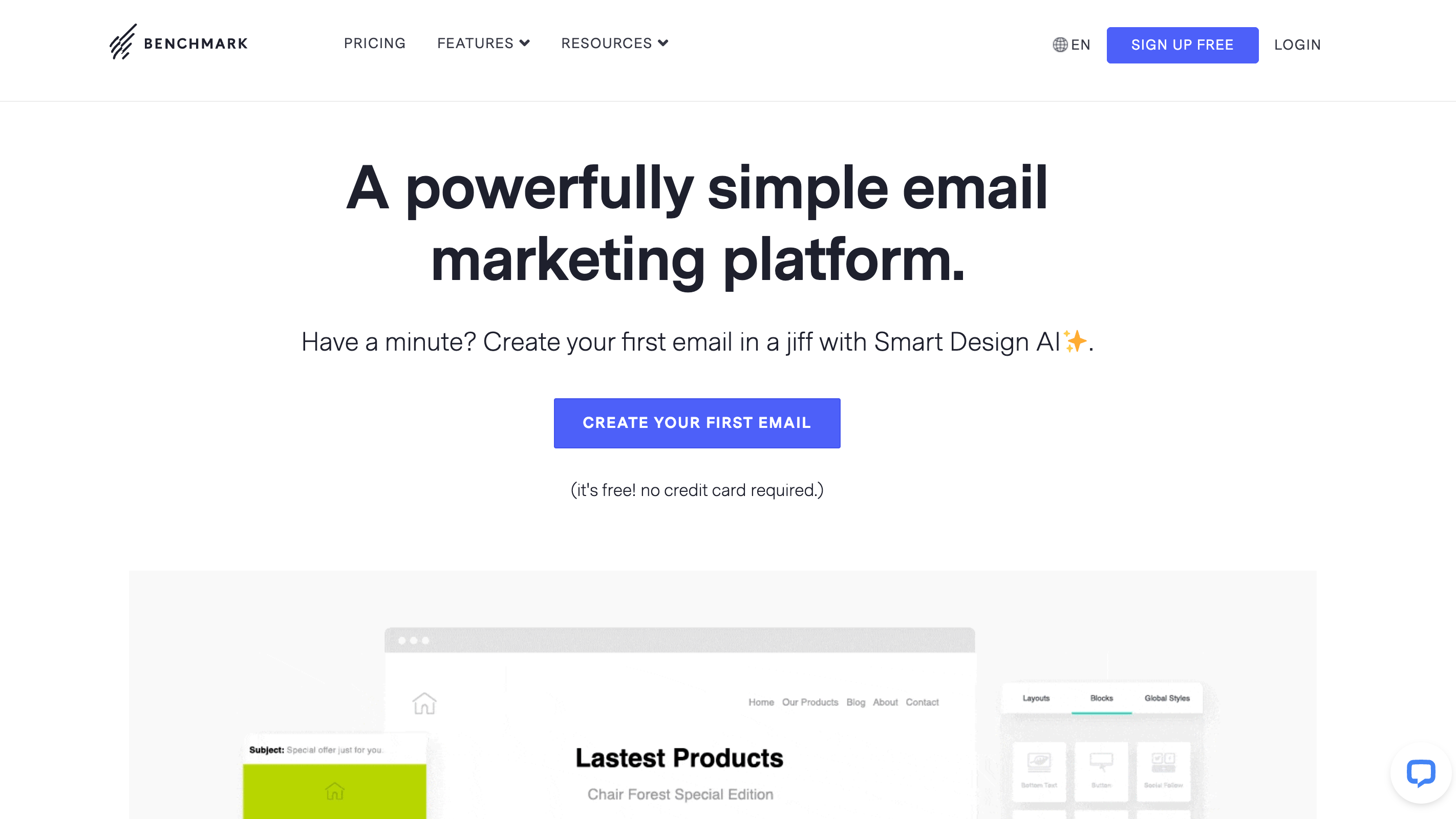
Benchmark offers an easy-to-use platform with solid templates, surveys, and autoresponders.
Key Features:
-
Email editor with smart sections
-
Autoresponders and drip campaigns
-
Polls, surveys, and signup forms
-
Real-time reporting
Pros:
Benchmark balances ease of use with helpful features. It’s especially good for collecting audience feedback through embedded polls and forms.
Cons:
Automation is limited compared to tools like Moosend or ConvertKit.
Best For:
Businesses focused on engagement and feedback through email.
9. ActiveCampaign – Best for Data-Driven Marketing and CRM Integration
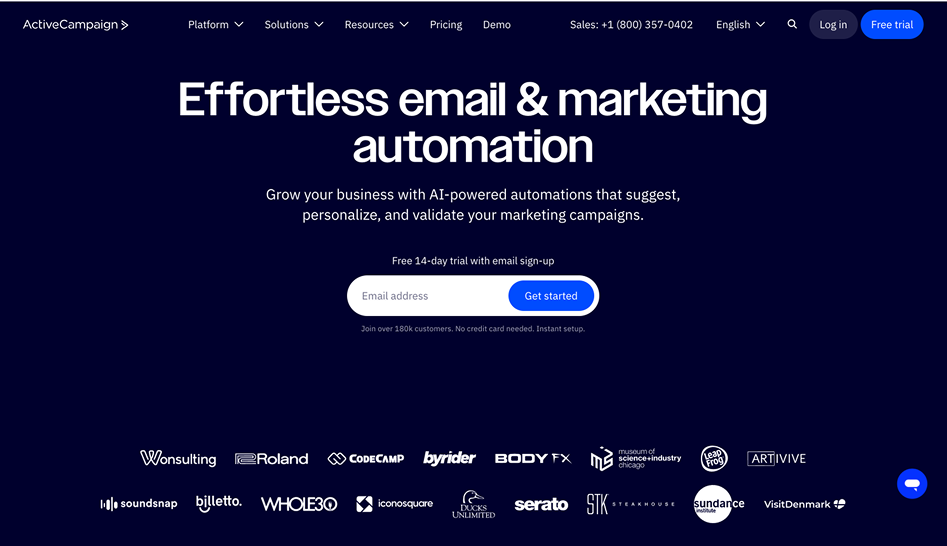
ActiveCampaign is a robust platform for marketers who want CRM, automation, and sales tools in one.
Key Features:
-
Visual automation and sales pipelines
-
Advanced segmentation and scoring
-
CRM tools with email marketing
-
Predictive sending and machine learning
Pros:
If your business is scaling and you want hyper-personalized journeys, ActiveCampaign delivers. You can automate complex workflows, score leads, and track conversions in one place.
Cons:
The complexity can overwhelm small teams or new marketers. It’s best suited to experienced users.
Best For:
Growing businesses and marketing teams ready for enterprise-level tools.
Final Verdict: Which Constant Contact Alternative is Right for You?
There’s no one-size-fits-all solution — the best Constant Contact alternative depends on what you’re looking to improve.
-
Need a design + publishing combo for email and social? → Choose PosterMyWall
-
Looking for advanced email workflows with CRM? → Go with ActiveCampaign or Mailchimp
-
Want affordability without sacrificing automation? → Try MailerLite or Moosend
-
Are you a creator growing a loyal audience? → ConvertKit is your best bet
-
Need SMS and transactional emails in one? → Pick Sendinblue/Brevo
If you’re tired of clunky editors, overpriced plans, or jumping between tools, platforms like PosterMyWall offer a breath of fresh air — especially for marketers with limited time and budgets.
Build Better Campaigns with PosterMyWall
PosterMyWall makes it easy to design, schedule, and send beautiful emails — plus social posts and videos — without switching platforms.